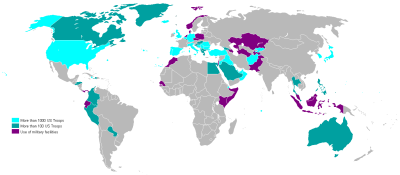The Long View 2002-08-08: War Talk

US Military Bases Worldwide in 2007This post of John's is a good reminder of how we got ourselves into this mess. The first Gulf War was a rousing success. In the lead-up to that war, lots of respectable people said the war would devolve into a messy guerrilla campaign and there was nothing in Iraq worth American boys dying for.
All of those people were discredited when the first Gulf War turned into a quick and easy rout of the Iraqi army. Some of the things that were said were silly, such as the suggestion that America would bomb Iraqi cities flat like we did to Japan and Germany in WWII. However, now all the critics of war can plausibly say: I told you so. What is less clear is what would have actually happened had the critics of war in Iraq prevailed.
Part of the reason that John took the stance that he did was that he felt 9/11 was fostered by an attitude of indifference to the petty territorial squabbles and the multitude of terrorist organizations that characterize not only the Middle East, but the whole Third World. John felt that the "mind our own business" solution to attracting the lethal attention of terrorist organizations had already been tried in the 1990s, and found wanting.
I'm sympathetic to the "mind our business" point of view. I think the most memorable version of this is Steve Sailer's "Invade the World, Invite the World." What stops me from embracing it wholly is John's counter-factual: "okay, what else then?" In order to realize the posited alternative, we would need to completely change American policy and attitudes towards immigration, as well as roll up some or all of our overseas military commitments. How likely is this to happen? And if we succeed, what kind of world will result from our decision?
War Talk
The build-up to Gulf War II has this advantage over the build-up to Gulf War I: at least now we know who to ignore. To take a particularly egregious example, National Public Radio's coverage was so tendentious the last time around that Scott Simon did a very funny apology after the war was over.
No, the treads did not fall off the tanks, as NPR interviewees suggested they would. No, cities were not leveled by carpet bombing. No, the war did not drag out into a guerrilla campaign. In fact, though the failure to remove the Baathist government did mar the victory, it became impossible to disguise the fact that Gulf War I was a war of liberation. A surprising amount of the old peace movement had been able to mobilize to prevent US intervention, but it was so discredited by the outcome that little of it survives today.
Perhaps the saddest case is the veteran columnist, Mark Shields. He would appear on the McNeil/Lehrer show night after night in 1990 to make plausible predictions of catastrophe if the US advanced into Kuwait. Speaking as a war veteran, he insisted that there was nothing at issue in the Gulf that was worth young Americans dying for. Again, his warnings about the course and outcome of the war turned out to be wrong, but it was hard to dismiss their sincerity.
It's not hard anymore. Shields is a liberal Democrat, but he had once been able to break ranks and say things that were novel and often important. Like most of the commentariat, he lost that ability during the Clinton Administration. Republicans are often just as unthinkingly partisan, but Shields had once been worth listening to.
What brought this to mind was a recent appearance of his on the Jim Lehrer New Hour (McNeil having long-since retired) to make almost the same arguments he had been making a dozen years ago. He praised the strange stories that the New York Times has been running. These stories claim to report leaks that show the US military is against an invasion of Iraq, and that it will agree to an invasion only if huge forces are used that take at least six months to prepare. Shields insisted vehemently that this attitude is the correct one for the military to take: it's the men and women in uniform who are going to be on the line, not the civilian hawks in the Defense Department, he insisted.
That is backwards. It is precisely American civilians who are on the line in the terror war. In fact, the civilians in the Pentagon turned out to be in more danger than the armed forces on September 11. Thousands of American civilians were killed on that day; hundreds of thousands will be killed at no distant date, if the regimes of the Axis of Evil are not changed in short order.
It is actually very unlikely that the Times stories represent thinking inside the military. General Tommy Franks of the Central Command has been tarred with a reputation for obstructionism that he does not deserve. However, it is true that a replay of Gulf War I would not be good enough. If it were really true that the best the military can do is promise to build the Maginot Line on the Euphrates by 2005, then it would be time to take the institution apart and rebuild it from scratch.
Let me put it this way: the plausibility that force will be used is a force multiplier. The Maginot Line is actually a good example. When the Germans sent a token force into their own Rhineland in 1936, an area that was supposed to remain demilitarized, the French prime minister asked the army commander-in-chief to dislodge it. The commander was rather shocked. He said he could order a general mobilization, but he had nothing like the standby expeditionary force the prime minister seemed to be contemplating. The Germans knew this too, so they risked reoccupation, despite the overwhelming superiority of the French at the time. The fact is we need a military that can deploy a war-winning force anywhere in the world in a week or two. We also need a political situation in which this can happen routinely, scarcely making the front pages.
The constitutional objections to presidential war-making authority are chimerical. Though the Constitution says that only Congress can declare war, the Constitution also says that only Congress can grant letters of marque and reprisal. Letters of marque and reprisal were creatures of the law of nations that became extinct in the 19th century; the declaration of war pretty much disappeared in the 20th. The power of Congress over the military is now chiefly through the budget, and it is quite enough.
As for deployment anywhere in the world within two weeks, the idea is nonsense on it's face. It's still necessary.

Comments ()